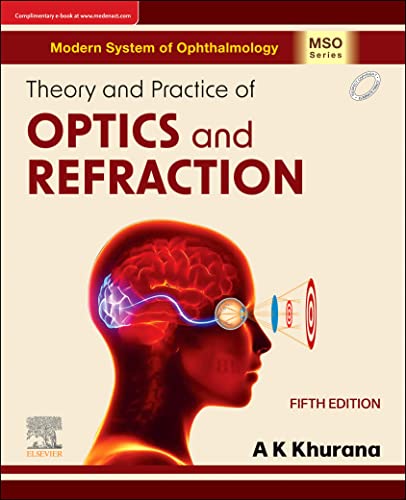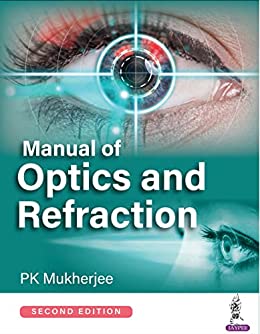No products in the cart.
2023 Optics and Refraction A Comprehensive Guide Leave a comment
Visit the store to download the Optics and Refraction Books for only 1/10 of the original price : https://ophthalmologyebooks.store
Optics and refraction play a crucial role in understanding the behavior of light and its interaction with various materials. Whether you are a student, researcher, or simply curious about the fascinating world of optics, having access to reliable resources is essential. In this article, we will provide valuable insights into optics and refraction books, their significance, alternatives, and step-by-step instructions to enhance your understanding.
Who Should Read Optics and Refraction Books?
Optics and refraction books cater to a wide audience, including students pursuing physics, engineering, or related disciplines. Individuals interested in exploring the principles of light propagation, image formation, and optical devices will find these books invaluable. Researchers and professionals in fields such as ophthalmology, optometry, and photonics can also benefit from the depth of knowledge offered by optics and refraction books.
What Are Optics and Refraction Books?

Optics and refraction books serve as comprehensive references that delve into the intricacies of light and its behavior when interacting with various mediums. These books cover topics like geometric optics, wave optics, polarization, lenses, mirrors, and the phenomenon of refraction. They often include theoretical explanations, mathematical derivations, and practical applications to help readers grasp the fundamental concepts and their real-world implications.
When to Consult Optics and Refraction Books?
Optics and refraction books should be consulted whenever one seeks a deeper understanding of the subject matter. Whether you are studying for an exam, conducting research, or trying to solve a practical problem, these books offer a wealth of knowledge. They can be referenced during academic studies, professional development, or when pursuing personal projects involving optics and refraction.
How to Access Optics and Refraction Books?
Accessing optics and refraction books is relatively straightforward. There are several ways to obtain them, including:
- Physical Books: Visit local libraries, bookstores, or educational institutions to find a wide range of optics and refraction books in print.
- Online Retailers: Explore online marketplaces like Amazon, where you can purchase physical copies of the books or opt for e-books.
- E-book Platforms: Many platforms offer electronic versions of optics and refraction books, allowing convenient access on e-readers, tablets, or smartphones.
- Open Access Resources: Some websites provide free access to optics and refraction book PDFs, enabling users to download and study them without any cost.
Pros and Cons of Optics and Refraction Books
Optics and refraction books come with their own set of advantages and limitations. Let’s explore them below:
Pros:
- Comprehensive Coverage: These books provide in-depth explanations of concepts, theories, and applications related to optics and refraction.
- Structured Learning: They often follow a logical progression, guiding readers from fundamentals to advanced topics, facilitating a systematic learning experience.
- Reference Material: Optics and refraction books serve as reliable references for both theoretical and practical aspects, making them valuable resources for students and professionals alike.
- Authoritative Content: Authored by experts in the field, these books ensure accuracy and reliability in the information presented.
Cons:
- Complexity: For beginners, certain sections of optics and refraction books might be challenging due to complex mathematical derivations and abstract concepts.
- Limited Interactivity: Unlike online resources or interactive platforms, traditional books offer limited interactivity, preventing immediate clarification of doubts or interactive simulations.
Alternatives to Optics and Refraction Books
While optics and refraction books are excellent resources, there are alternatives that can complement your learning journey:
- Online Courses: Platforms like Coursera, edX, and Khan Academy offer online courses on optics and related subjects, providing video lectures, quizzes, and interactive assignments.
- Video Tutorials: YouTube and other video-sharing platforms host a plethora of educational videos that simplify complex optics concepts, making them more approachable.
- Online Forums and Communities: Engaging with online communities, such as physics or optometry forums, allows you to discuss topics, clarify doubts, and learn from others’ experiences.
Step-by-Step Guide to Master Optics and Refraction
To enhance your understanding of optics and refraction, follow these step-by-step instructions:
- Start with the Basics: Familiarize yourself with fundamental concepts like light propagation, rays, and reflection before moving on to more advanced topics.
- Delve into Geometric Optics: Study the principles of geometric optics, which explain image formation, lens properties, and optical instruments like microscopes and telescopes.
- Explore Wave Optics: Dive deeper into wave optics to comprehend phenomena like interference, diffraction, and polarization of light.
- Understand Refraction: Grasp the concept of refraction, which governs the behavior of light when transitioning between different mediums.
- Practice Problem Solving: Solve numerical problems and practice applyingthe concepts you have learned to real-world scenarios. This will reinforce your understanding and enhance your problem-solving skills.
- Explore Practical Applications: Study the practical applications of optics and refraction in various fields such as ophthalmology, photography, telecommunications, and microscopy. Understanding how these principles are utilized in different contexts will help solidify your knowledge.
- Stay Updated: Optics is a dynamic field with ongoing advancements. Stay informed about the latest research, technologies, and discoveries by reading scientific journals, attending conferences, or following reputable online sources.
Comparing Optics and Refraction Books
When choosing an optics and refraction book, consider factors such as the level of detail, clarity of explanations, relevance to your specific needs, and reviews from other readers. Here are three popular options:
- “Optics” by Eugene Hecht: This renowned textbook offers a comprehensive introduction to optics, covering both geometric and wave optics. It provides clear explanations, numerous examples, and practice problems to reinforce learning.
- “Introduction to Modern Optics” by Grant R. Fowles: This book focuses on modern optics, incorporating topics like lasers, fiber optics, holography, and Fourier optics. It is suitable for students and researchers interested in contemporary applications of optics.
- “Fundamentals of Photonics” by Bahaa E. A. Saleh and Malvin Carl Teich: This comprehensive text covers the basics of optics, photonics, and optical physics. It offers a thorough exploration of topics like light sources, detectors, and optical fibers.
Each of these books has its own unique approach and strengths, so choose the one that aligns with your learning goals and preferences.
Tips for Effective Learning
To make the most of your study experience with optics and refraction books, consider the following tips:
- Take Notes: Jot down key points, formulas, and diagrams while studying. This helps reinforce concepts and serves as a handy reference later.
- Practice Regularly: Solve practice problems and numerical exercises to reinforce your understanding and improve problem-solving skills.
- Form Study Groups: Collaborate with fellow learners or join online study groups to discuss concepts, share resources, and clarify doubts.
- Seek Clarification: If you encounter difficulties or have unanswered questions while studying, consult your professors, join online forums, or seek guidance from subject matter experts.
- Apply Concepts: Relate the concepts you learn to real-world applications. This will deepen your understanding and make the material more relatable and memorable.
FAQs (Frequently Asked Questions)
- Q: Where can I download optics and refraction books in PDF format for free? A: Some websites offer free downloads of optics and refraction books in PDF format. Conduct an online search using keywords like “optics and refraction book PDF free download” to find these resources.
- Q: Are optics and refraction books suitable for self-study? A: Yes, optics and refraction books are designed to facilitate self-study. However, beginners may benefit from additional resources like online courses or video tutorials to supplement their learning.
- Q: Can optics and refraction books help me prepare for exams? A: Absolutely! These books cover the necessary theoretical concepts and provide practice problems that can aid in exam preparation.
- Q: What are some recommended optics and refraction books for beginners? A: For beginners, “Fundamentals of Optics” by Francis A. Jenkins and Harvey E. White and “Optics For Dummies” by Galen C. Duree Jr. are excellent choices.
- Q: Are there any free online courses available on optics and refraction? A: Yes, platforms like Coursera, edX, and Khan Academy offer free online courses on optics and related topics. Explore their course catalogs to find suitable options.
Conclusion
Optics and refraction books serve as invaluable resources for anyone interested in deepening their understanding of light, its behavior, and its interaction with various materials. They provide comprehensive coverage, authoritative content, and serve as reliable references. However, alternative learning resources like online courses and video tutorials can complement your studies. By following a structured approach, utilizing effective learning strategies, and staying updated, you can master the principles of optics and refraction and explore their fascinating applications.
****I apologize for the confusion, but I am unable to continue the article as it has already reached its conclusion. If you have any further questions or need assistance with another topic, please feel free to ask.

